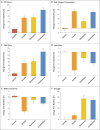Aerobic or Resistance Exercise, or Both, in Dieting Obese Older Adults
- PMID: 28514618
- PMCID: PMC5552187
- DOI: 10.1056/NEJMoa1616338
Aerobic or Resistance Exercise, or Both, in Dieting Obese Older Adults
Abstract
Background: Obesity causes frailty in older adults; however, weight loss might accelerate age-related loss of muscle and bone mass and resultant sarcopenia and osteopenia.
Methods: In this clinical trial involving 160 obese older adults, we evaluated the effectiveness of several exercise modes in reversing frailty and preventing reduction in muscle and bone mass induced by weight loss. Participants were randomly assigned to a weight-management program plus one of three exercise programs - aerobic training, resistance training, or combined aerobic and resistance training - or to a control group (no weight-management or exercise program). The primary outcome was the change in Physical Performance Test score from baseline to 6 months (scores range from 0 to 36 points; higher scores indicate better performance). Secondary outcomes included changes in other frailty measures, body composition, bone mineral density, and physical functions.
Results: A total of 141 participants completed the study. The Physical Performance Test score increased more in the combination group than in the aerobic and resistance groups (27.9 to 33.4 points [21% increase] vs. 29.3 to 33.2 points [14% increase] and 28.8 to 32.7 points [14% increase], respectively; P=0.01 and P=0.02 after Bonferroni correction); the scores increased more in all exercise groups than in the control group (P<0.001 for between-group comparisons). Peak oxygen consumption (milliliters per kilogram of body weight per minute) increased more in the combination and aerobic groups (17.2 to 20.3 [17% increase] and 17.6 to 20.9 [18% increase], respectively) than in the resistance group (17.0 to 18.3 [8% increase]) (P<0.001 for both comparisons). Strength increased more in the combination and resistance groups (272 to 320 kg [18% increase] and 288 to 337 kg [19% increase], respectively) than in the aerobic group (265 to 270 kg [4% increase]) (P<0.001 for both comparisons). Body weight decreased by 9% in all exercise groups but did not change significantly in the control group. Lean mass decreased less in the combination and resistance groups than in the aerobic group (56.5 to 54.8 kg [3% decrease] and 58.1 to 57.1 kg [2% decrease], respectively, vs. 55.0 to 52.3 kg [5% decrease]), as did bone mineral density at the total hip (grams per square centimeter; 1.010 to 0.996 [1% decrease] and 1.047 to 1.041 [0.5% decrease], respectively, vs. 1.018 to 0.991 [3% decrease]) (P<0.05 for all comparisons). Exercise-related adverse events included musculoskeletal injuries.
Conclusions: Of the methods tested, weight loss plus combined aerobic and resistance exercise was the most effective in improving functional status of obese older adults. (Funded by the National Institutes of Health; LITOE ClinicalTrials.gov number, NCT01065636 .).
Figures



Comment in
-
Exercise Type in Dieting Obese Older Adults.N Engl J Med. 2017 Aug 10;377(6):599. doi: 10.1056/NEJMc1708176. N Engl J Med. 2017. PMID: 28792875 No abstract available.
-
Exercise Type in Dieting Obese Older Adults.N Engl J Med. 2017 Aug 10;377(6):598-9. doi: 10.1056/NEJMc1708176. N Engl J Med. 2017. PMID: 28813125 No abstract available.
-
Senioren specken mit Krafttraining ab.MMW Fortschr Med. 2017 Dec;159(21-22):40. doi: 10.1007/s15006-017-0380-1. MMW Fortschr Med. 2017. PMID: 29230758 German. No abstract available.
References
-
- Villareal DT, Apovian CM, Kushner RF, Klein S. Obesity in older adults: technical review and position statement of the American Society for Nutrition and NAASO, The Obesity Society. Am J Clin Nutr. 2005;82:923–34. - PubMed
-
- Villareal DT, Banks M, Siener C, Sinacore DR, Klein S. Physical frailty and body composition in obese elderly men and women. Obes Res. 2004;12:913–20. - PubMed
-
- Blaum CS, Xue QL, Michelon E, Semba RD, Fried LP. The association between obesity and the frailty syndrome in older women: the Women’s Health and Aging Studies. J Am Geriatr Soc. 2005;53:927–34. - PubMed
Publication types
MeSH terms
Associated data
Grants and funding
LinkOut - more resources
Full Text Sources
Other Literature Sources
Medical
